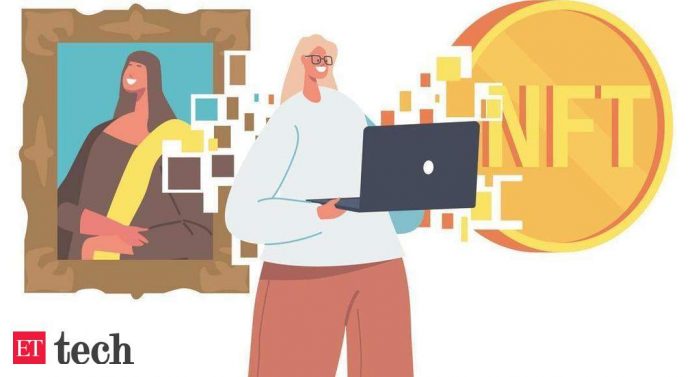We first wrote about these new-fangled assets in March, when the auction house Christie’s sold a piece of digital art — a jpeg file — by the artist Beeple for $69 million. It remains the most valuable NFT-backed artwork to this day and has led to the creation of a nascent digital art ecosystem.
Since that landmark sale, marketplaces for NFT-backed digital art have mushroomed all over the world and a host of celebrities — from Eminen and Paris Hilton to Amitabh Bachchan and Salman Khan — have launched their own NFT-backed digital collectibles.
OpenSea, the world’s biggest NFT marketplace, saw nearly $2 billion in transaction volume and had about 236,000 unique user addresses interacting with it in just the past 30 days, according to DappRadar. And that’s just one platform.
But as we said back in March, NFTs can be used for much more than just certifying digital art pieces and collectibles. In fact, using NFTs only for these is the equivalent of using the internet only to send email — there’s a lot you’re missing out on.
Such as?
Before we get into that, it would help to have a clear understanding of what NFTs are, as they are often confused with the artworks or collectibles they represent.
A fungible asset is something that can be readily interchanged, like currency notes. Crypto assets such as bitcoin, which were created to serve as currencies, are thus also fungible — any two bitcoins are identical and therefore interchangeable.
NFTs are also crypto assets that exist on blockchains (cryptographic digital ledgers), but unlike bitcoin and other cryptocurrencies, each token is entirely unique. This makes them useless as a currency, of course, but extremely useful for things like certifying pieces of digital art, as we have seen.
Before NFTs, no-one could have sold a jpeg (which could be easily and endlessly copied by anyone) for millions of dollars as there was no way to prove which of the millions of copies was the original. While a jpeg can be copied, an NFT can’t. In addition, NFTs can be programmed through so-called smart contracts to automatically do things like give the artist a cut every time their digital art is sold.
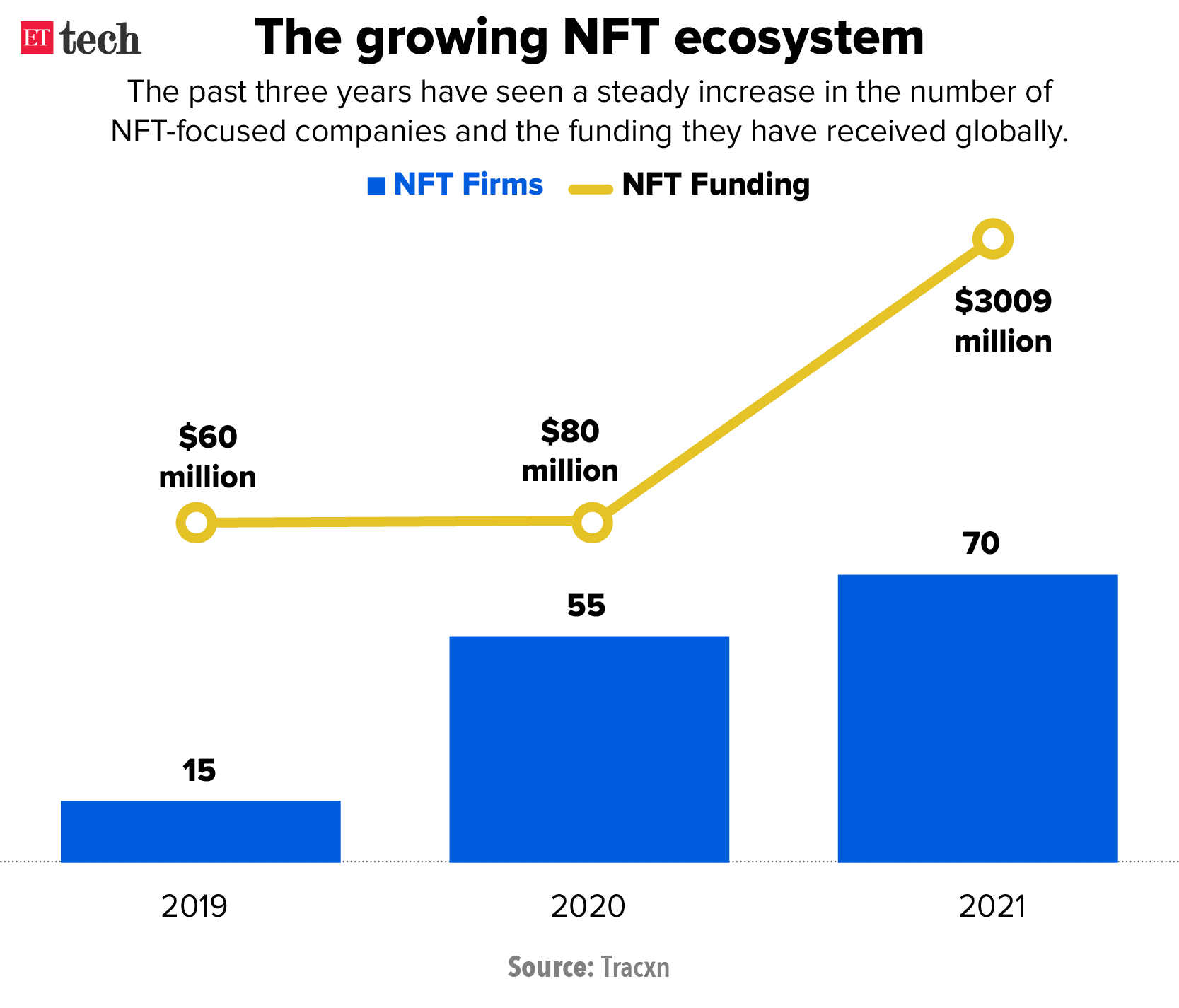
But as we said in March, NFTs have uses beyond certifying digital art and collectibles. Here are a few:
Gaming
NFTs are already revolutionising in-game purchases in video games. Until now, digital assets bought inside a game still belonged to the game company. But tying these virtual assets to NFTs would shift ownership to the actual players, who would be free to buy and sell these among themselves. Entire games are now being based around NFTs.
As an example, players could collect NFTs as they progress through the levels of a game. After they complete the game they could sell the tokens they earned for a profit as they would have full — and provable — ownership.
Ticketing
NFTs have obvious and very powerful potential uses in the ticketing industry. They could be used to represent tickets to a sports event or a concert, ensuring that every attendee has original access. NFT-based tickets would also curb counterfeiting as they could be easily verified as original on the secondary market.
Through smart contracts, NFT tickets could be programmed to automatically transfer royalties to the team. Franchises could also give special NFTs to season ticket holders that entitle them to, say, a signed jersey or a meeting with their favourite player.
Curbing fakes
The fashion and sports industries are plagued with the issue of counterfeit merchandise, and blockchain and NFTs offer a solution, since NFTs can in theory be used to certify any asset, not just digital ones, as is the case now.
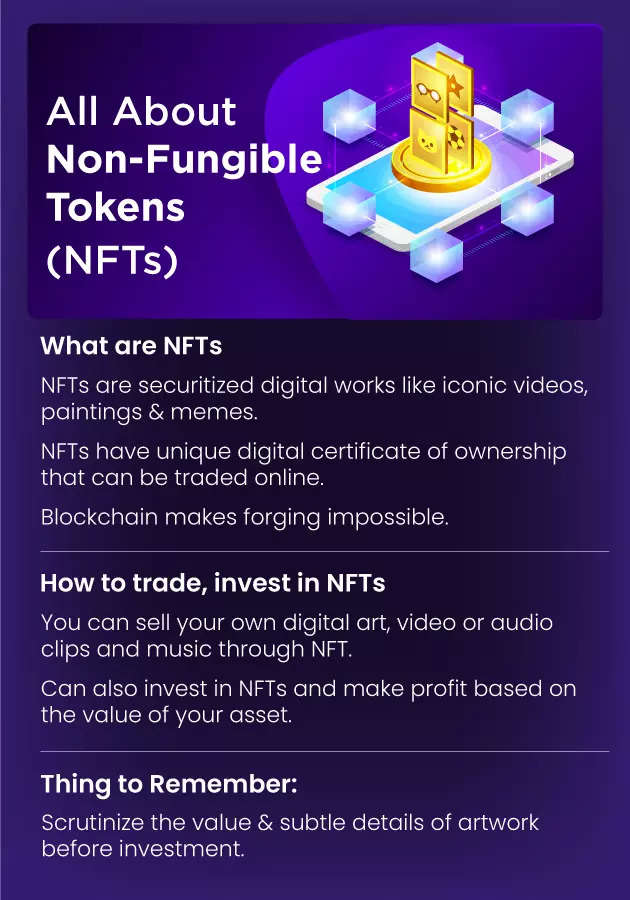
Source: ET Online
Keeping land records
Physical land could one day be represented on a blockchain as an NFT, which would contain all its attributes, such as its size, location and current price. Because non-fungible tokens and the blockchains they run on are practically impossible to tamper with, and allow for easy verification, NFT-based land records are a potential solution to crimes relating to identity and ownership. Think of all the hours in court they would save, not to mention the lawyer fees.
While tokenisation of land in the real world is one for the future, NFT-backed real estate is already a reality in online worlds such as Decentraland, where a plot of virtual land was sold for about $913,000 in June.
BIG STORIES BY OUR REPORTERS
Nykaa was built for a life in the stock markets: Falguni Nayar
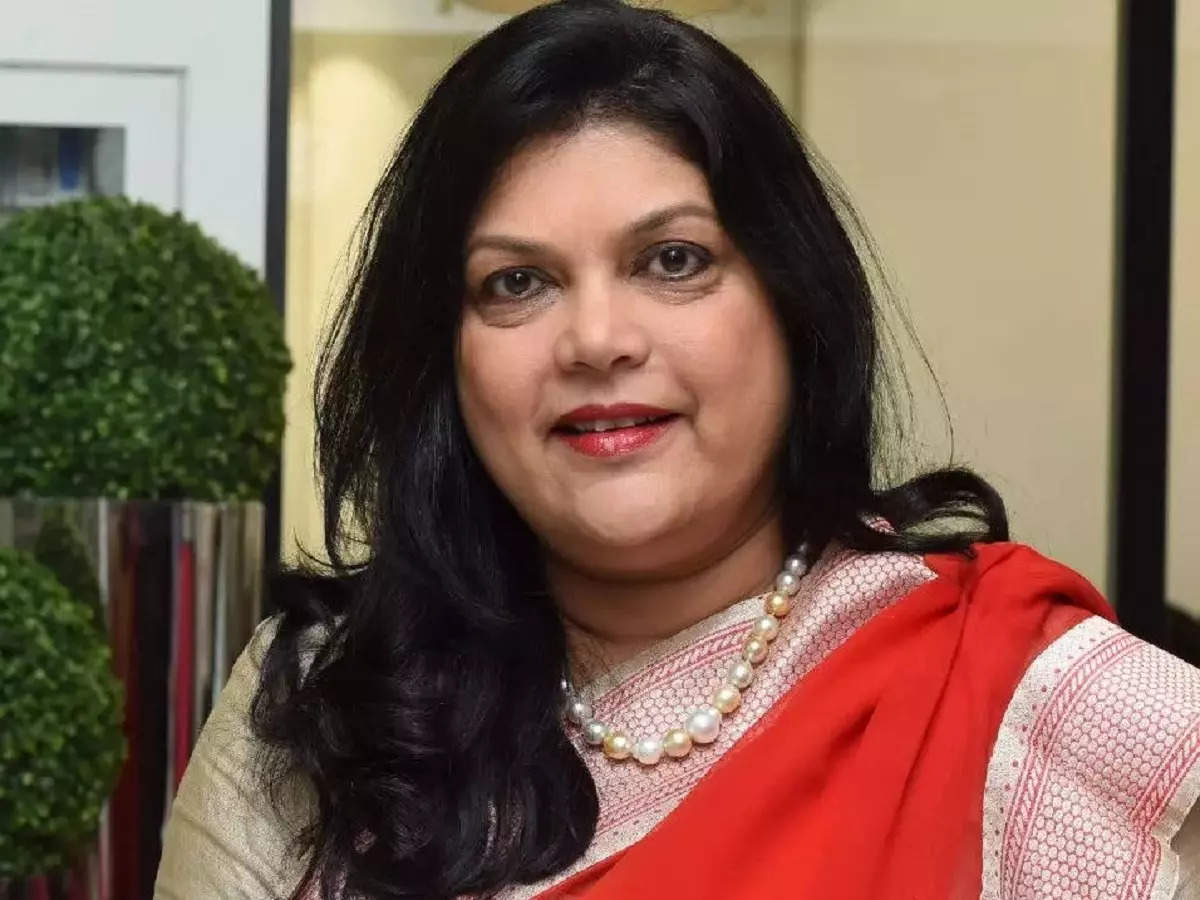
Nykaa founder Falguni Nayar
FSN E-Commerce Ventures, which runs the online beauty and fashion marketplace Nykaa, hit the Indian bourses on Wednesday in what was a bumper debut for the company. Its market capitalisation surged past Rs 1 lakh crore after the company’s stock started trading at premium of more than 80% over its issue price.
For Nykaa’s founder & CEO Falguni Nayar, an acclaimed investment banker with Kotak Mahindra Bank who turned entrepreneur nine years ago, the listing propelled her into the club of top billionaires.
In an interview after Nykaa’s blockbuster listing, Nayar spoke about how she built the company differently from other tech startups, about it being promoter-led, what that means for professionals in new-age companies like hers, and her next milestone after the IPO.
Related Coverage
■ How Falguni Nayar built Nykaa to stand out from the crowd
■ Nykaa eyes inorganic growth opportunities to build a house of brands
Zomato hits all-time high after Q2 results, inclusion in MSCI India
Shares of Zomato Ltd. gained 10.08% intraday to a record Rs 155 apiece on the BSE after the food-delivery firm was included in the MSCI India Index. The stock pared some of the gains but still ended the trading session at an all-time high of Rs 153.30 — or 8.88% higher than previous close.

Zomato cofounder Deepinder Goyal
That was after the Deepinder Goyal-led firm reported its September quarter results on Wednesday. Net loss widened to Rs 430 crore from Rs 356 crore in the preceding three months on the back of revenue that rose 21% sequentially to Rs 1,024 crore.
Separately, Zomato announced plans to deploy $1 billion in startups over the next couple of years. It also announced key investments in three companies — Shiprocket, Magicpin and Cultfit (formerly Curefit).
Also Read: With just six months of cash in bank, IPO was a desperate contingency plan: Zomato CEO
Meanwhile in the US, Indian-origin SaaS firm Freshworks Inc. initiated a share sale worth over $500 million to allow its top management, board directors and employees to cash out part of their shares in the company post listing. Separately, it announced the launch of Freshstack, a unified customer relationship management offering for customer support, sales and marketing teams at startups.
Latest on startup IPOs
■ Ola (ANI Technologies): The Bhavish Aggarwal-led firm is finalising a pre-IPO funding round — likely to be led by IIFL Wealth Management and Edelweiss Private Equity — that would increase the ride-hailing company’s valuation to as much as $7 billion.
■ Paytm (One97 Communications): The Vijay Shekhar Sharma-led fintech firm has priced its stock at the upper end of the IPO price band, according to the final prospectus filed with the RoC. That after response to India’s biggest IPO was muted in the Nov. 8-10 share sale. Paytm will list on Nov. 18.
■ PharmEasy (API Holdings): The parent company of India’s biggest epharmacy has filed draft papers with the markets regulator for a Rs 6,250-crore IPO, which is likely to be a purely primary share sale. The Mumbai-based firm is likely to consider raising Rs 1,250 crore via a private placement of shares before filing its red herring prospectus.
From the crypto world
The latest on India’s data laws
ETtech DEALS DIGEST

Good Glamm CEO Darpan Sanghvi
- Good Glamm, which recently turned unicorn after a $150-million fundraising led by Prosus Ventures and Warburg Pincus, is in talks to acquire skin care brand St Botanica. If the deal goes through, it would be the company’s fifth acquisition after ScoopWhoop, The Moms Co, Baby Chakra and POPXo.
- Fintech Razorpay is finalising a new funding round of $200-250 million that could double the valuation of the digital payments startup to around $5.5-6 billion, according to people briefed on the matter.
- Byju’s has raised $1.2 billion via an upsized term loan overseas, a move that pegs the valuation of India’s biggest edtech startup at $18 billion. The company had planned to raise $700 million but decided to go for more to take advantage of lower rates internationally.
- Edtech startup Brightchamps, which offers online courses on programming, AI, design thinking and financial literacy to kids aged 6-16 years, has raised $51 million from Premji Invest and others at a valuation of $500 million.
MORE TOP STORIES

(From left) A91 founders VT Bharadwaj, Abhay Pandey and Gautam Mago
Investors feeling like a commodity due to liquidity surplus, A91 says: A91 Partners, which closed its second India dedicated fund at $550 million, has been in the group of more conservative investors, at a time when India is seeing record dealmaking across private and public markets.
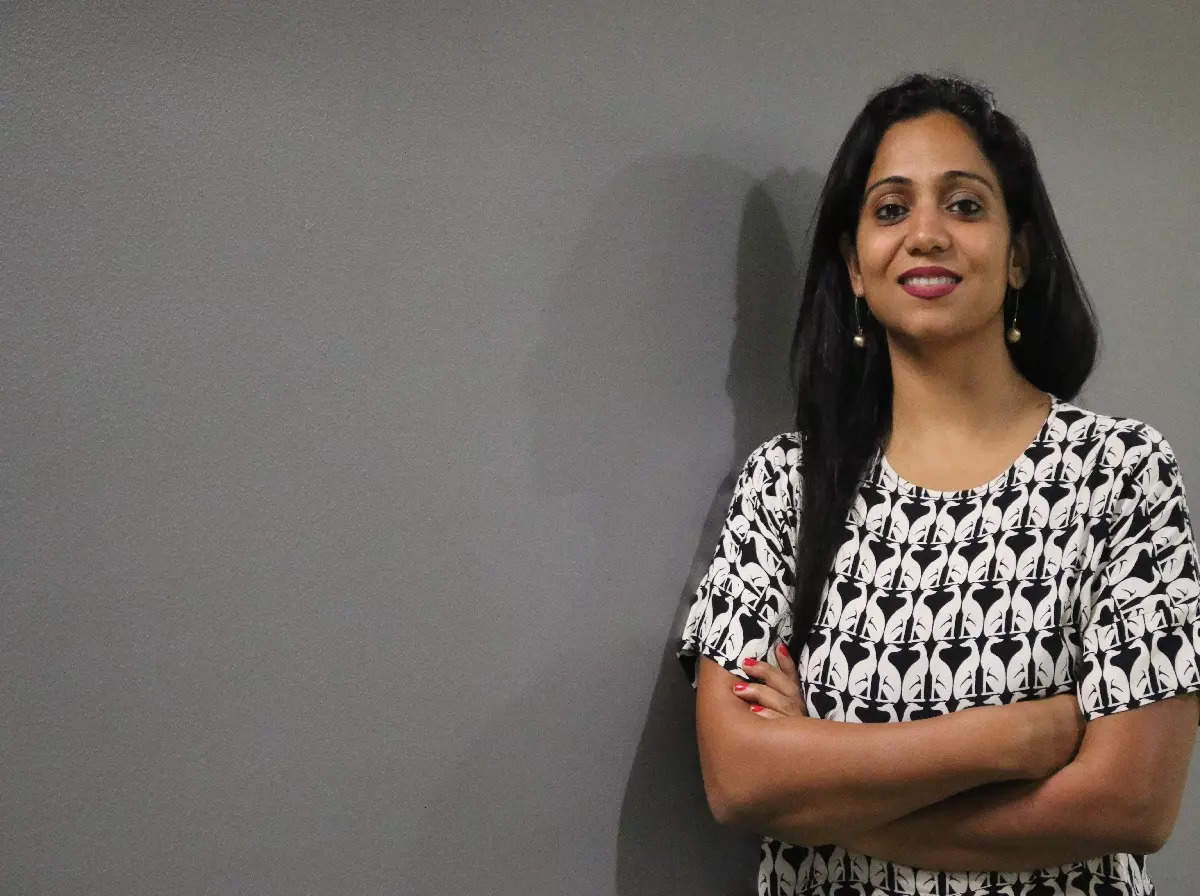
New Myntra CEO Nandita Sinha
Myntra gets a new CEO in Nandita Sinha: Flipkart-owned Myntra has appointed Nandita Sinha as its new CEO in place of Amar Nagaram. This is the first time a woman executive will be at this position in the ecommerce group. Earlier in the week, ETtech reported that Myntra has become one of the first major etailers in India to start testing influencer-led live online shopping on its platform.
Tata Digital seeks consent ahead of super app launch: Tata Digital has commenced the challenging task of taking ‘consumer consent’ from group operating companies to meet the consumer data privacy protection norms before the official launch of its super app.
India on top of Facebook’s 2021 Integrity Prioritisation List: India came on top of Facebook’s Integrity Country Prioritisation list for 2021 — an internal list of countries that are at the highest risk of violence, hate speech and misinformation among other harms drawn by the company, now renamed Meta.
That’s all from us this week. Stay safe and get that jab.
